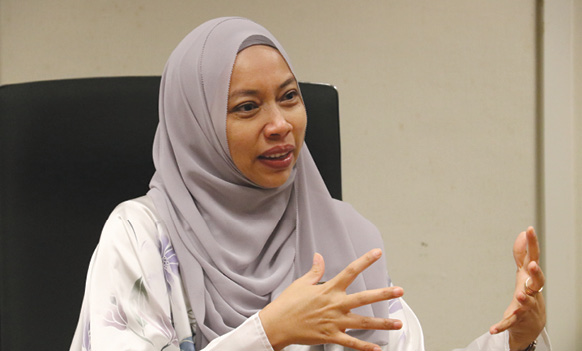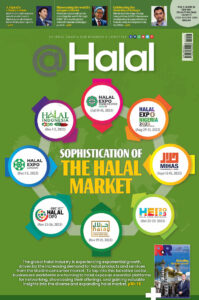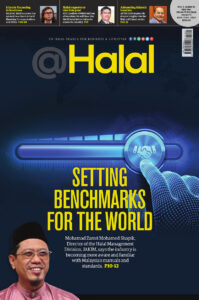ITC’s industry development division drives Islamic Tourism Roadshow and unveils 10 MFAR guidelines
BY FATIHAH MANAF
The Islamic Tourism Centre (ITC) has proactively supported and empowered tourism industry players since 2009. With a clear objective, ITC, under its industry development division, has organised two significant programmes during its Islamic Tourism Roadshow: the Islamic Tourism Entrepreneurship and Leadership Seminar (ITELS) and Let’s Sembang Together on Muslim-Friendly Tourism and Hospitality Assurance and Recognition (MFAR) programme to help strengthen the Islamic tourism segment.
Marina Muhamad, Director of the Industry Development Division of ITC, said ITELS and Let’s Sembang Together MFAR represented two different approaches.
“Regarding ITELS, we aim to engage various players in the tourism and hospitality industry, such as hoteliers, spa owners, tourist guides, and tourism product operators. These business owners have experienced significant challenges during the Covid-19 and MCO
periods, resulting in losses and business contraction. To assist them in re-establishing their operations, ITELS serves as a platform to connect them with guiding agencies and financial institutions,” shared Marina.
“Our strategic partners include Majlis Amanah Rakyat (MARA) and banks, with Bank Islam currently on board. Additionally, we collaborate with Malaysia Digital Economy Corporation (MDEC), as its DE Rantau programme seeks registered accommodation hubs to be promoted to the digital nomads.”
She revealed that the agency also collaborated with State tourism boards nationwide to inform local players about the activities occurring within their respective States.
The Islamic Tourism Roadshow serves as a means to connect industry players with strategic partners who could provide guidance and opportunities that players might have yet to be aware of. As part of the roadshow, business coaches were invited to share insights on leadership and financial management.
The event format consisted of discussions in the first half of the day, followed by face-to-face interactions where participants could seek guidance from ITC’s strategic partners and address their concerns directly.
INTRODUCING 10 NEW MFAR GUIDELINES
ITC has expanded the scope of its MFAR programme from exclusively covering Muslim-friendly tourist accommodation premises to including spa and wellness centres, medical and healthcare facilities, travel agencies, transportation hubs, shopping malls, amusement parks, rest and service areas, tourism products and convention centres.
“We are in the process of developing standards and rating guidelines for Muslim-friendly tourism and hospitality products. Previously, this scheme was called the Muslim-friendly Tourism Products, Hospitality & Packages (MFT ProHPack), but now everything falls under the MFAR umbrella.
“The guidelines for tourist accommodation premises are already prepared, and we anticipate the readiness of guidelines for spa and wellness centres by the third quarter of this year. By the end of the year, we will open the application for spa owners and hoteliers to apply for Muslim-friendly spa recognition. The remaining schemes will be introduced gradually. The next one we are looking into is the medical and healthcare facilities,” explained Marina.
During the Islamic Tourism Roadshow, industry players were informed about the MFAR requirements, application process, and available silver, gold, and platinum ratings. Marina clarified that during the application stage, industry players did not specifically apply for a particular rating category; instead, they submitted their applications. Upon evaluation, ITC would provide them with the appropriate rating based on the fulfilment of the MFAR requirements.
She said: “We encourage all these industry players to get their premises rated. We are doing this to ensure that our tourism industry, industry players and Muslim-friendly infrastructure are ready and geared up towards Visit Malaysia 2025. By the time 2025 arrives, it will give us ample time to ensure that our industry players have their Muslim-friendly services and infrastructure ready. So when Muslim tourists come, their needs will be fulfilled.”
ENCOURAGING RESPONSE FOR ISLAMIC TOURISM ROADSHOW
“The first roadshow we had was in Ipoh. Alhamdulillah, the participation in the programme exceeded our expectations, and we received support from Perak’s tourism exco, YB Loh Sze Yee. Before the roadshow, we had the opportunity to meet him and explain our programmes. He then participated in our Let’s Sembang Together event held on May 30 at Sunway Lost World of Tambun, Perak,” said Marina.
With Perak being the first destination for the roadshow, she noted that ITC gained valuable insights and identified areas for improvement. The agency observed industry players’ genuine interest and curiosity regarding halal certification processes and requirements.
Thus, for the subsequent session of the Islamic Tourism Roadshow in Negeri Sembilan, ITC collaborated with Jabatan Hal Ehwal Agama Islam Negeri Sembilan (JHEAINS) to provide the participants with comprehensive explanations regarding halal certification. Looking ahead to future sessions in different states, Marina mentioned that ITC planned to continue to involve religious department officers to enhance this knowledge-sharing session further.
Regarding the Islamic tourism space in general, Marina said Malaysia was still ahead in terms of Muslim-friendly services and infrastructure. Still, some elements can be improved further to maintain Malaysia’s position as the top Muslim-friendly destination.
“It shows that we already have industry players in place. ITC, under its industry development division, aims to encourage more industry players to adopt this concept and get themselves recognised as Muslim-friendly. It will further strengthen Malaysia’s Muslim-friendly infrastructure, allowing for more creative itineraries and a wider range of destinations for Muslim travellers to explore.”
She emphasised ITC’s commitment to inclusivity, stating that its goal was to incorporate Muslim-friendly principles as a value-add across all tourism
segments, such as eco-tourism, edu-tourism, and more. Rather than being a standalone concept, ITC aimed to integrate Muslim-friendly practices seamlessly into the overall tourism experience.








